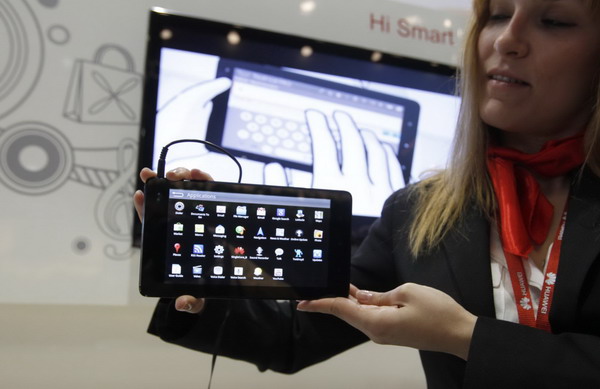Economy
Quiet China giant embodies technology aspirations
(Agencies)
Updated: 2011-06-15 18:25
 |
Large Medium Small |
|
 A IDEOS S7, Huawei's Android tablet, is displayed during the GSMA Mobile World Congress in Barcelona February 17, 2011. [Photo/Agencies]
|
As sales rose, Huawei Technologies Co invested to develop its own products, a radical step for a private company in the first decade of China's reforms to open its economy. But it paid off: Today, Huawei has grown into a major equipment supplier to phone carriers across Asia, Europe and Africa, with $28 billion in sales last year and 110,000 employees.
|
||||
"The consumer market, and especially the mid-range, is something we certainly will get into with our own brand," said Song Liuping, a Huawei vice president, in an interview at its tree-lined research campus in this southern Chinese city bordering Hong Kong.
In a country known as a cheap, anonymous factory, Huawei is a leader of an emerging group of Chinese companies that are creating brand-name technology in fields from telecoms to clean energy to medical equipment and starting to compete with Western industry leaders.
The newcomers can draw on a low-cost Chinese talent pool of engineers and scientists and support from government that is pushing to transform this nation of farmers and factory workers into a creator of profitable technologies.
Chinese companies are climbing the technology ladder faster than Japan and South Korea did in past decades, said Oded Shenkar, a professor at Ohio State University's Fisher College of Business who studies Chinese companies.
"In 10 to 15 years, China could be where South Korea is now, as far as having a number of global champions," Shenkar said.
Rising Chinese competition could hamper hopes by the United States and other Western governments to spur growth and create jobs by boosting high-tech exports.
Huawei has graduated from selling sturdy, low-cost gear to developing countries in Asia and Africa to supplying top global carriers. That is adding to pressure on Nokia Siemens Networks, Cisco, Sweden's Ericsson AB and France's Alcatel-Lucent SA.
"Many view Huawei as their main competitor over the next few years," said Mark Koh, an analyst for Frost & Sullivan, in an e-mail.
Huawei has grown at explosive speed but has to cope with complaints it copied rivals' products and suspicions it is a front for China's military. In February, a US government security panel rejected its purchase of a California computer company, 3Leaf Systems.
Huawei denies it is a security threat and invited Washington to investigate it after the failure of the 3Leaf acquisition.
The company was founded in 1987 by Ren Zhengfei, a former military engineer and one of China's most enigmatic business figures.
In a society where founders of Internet, retail and other companies far smaller than Huawei are celebrities, Ren never appears in public or talks to reporters. Forbes magazine estimated his wealth last year at $1.1 billion.
Ren started the company after his engineering unit was disbanded and he left the army, according to Huawei's February statement. He started with 21,000 yuan ($5,500 at the time) from his savings and a deal to sell phone switches supplied by a Hong Kong company. Demand boomed as Chinese carriers upgraded decrepit equipment at the start of reforms that would ignite China's economic boom.
Song said Huawei got into developing its own products almost by accident, launching a research arm only after its Hong Kong supplier was acquired by a state-owned company in 1990.
Early gear targeted rural Chinese phone companies and included a switching unit in 1994 marketed as "mouse-proof" for carriers that suffered from gnawed cables.
"Our main goal was survival," Song said.



